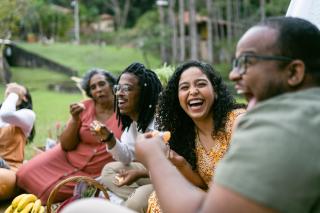Sacred Black "Text"
By Takiyah Nur Amin
“I hope and I pray that our faith can someday fulfill the promise of its theology.”
—Rev. Bill Sinkford
When I used to work with Black Lives of Unitarian Universalism (BLUU)—doing workshops or meeting people in UU congregations—inevitably a very well-meaning white person would ask, “Who’s the Black Emerson?” or “Who’s the Black Thoreau?”
This question is wrong; icky for so many reasons. One of the tenets of white supremacy culture is the prioritization of the written word, and not understanding that if you want to discover the “evidence” of Unitarianism, Universalism, or Unitarian Universalism in the lives of Black folks, it’s not always in written essays—because historically, we’ve had different trajectories: different levels of care and resources and access that would enable us to create something like that.

If you’re seeking sacred Black “text” in our tradition, you have to examine the way our Black ancestors lived. You have to seek out the Black folks who were in Unitarian and Universalist or UU congregations, and the work that they were doing in community—whether it was suffrage, or trying to educate Black children, or their working towards social action or civil access. Our “text” is embodied in the lives of people like Frances Ellen Watkins Harper, Joseph Jordan, David Eaton, and countless others.
One of the things I love about this tradition is that our faith is covenantal and not confessional—meaning that to some degree, our tradition cares little about what you stand up and say you believe. The evidence of your Unitarian Universalism is embodied in the depth of your relationships: how do you live in relationship to self and other? (I don’t just mean human other: to the plants, to the animals, to the stars…) The proof is in the pudding, for UUs. It’s not about what you have to say. How are you living?
Part of the source material that Black UUs in particular draw on to understand how we’re supposed to live within Unitarian Universalism today is in the lived reality of the people who came before us: how they lived out their values. The histories of our Black ancestors and forebearers inform, teach, guide, inspire, and orient us–if we let them–in how we can live out a faithful witness today.
When I came into this faith more than twenty years ago, there was a pervasive attitude that one could be Unitarian Universalist or proudly Black, but that the two were incompatible. I am heartened that today, through the sacrifices of so many and the legacies of our forebearers and ancestors in this faith tradition, I don’t hear that anymore. As a proud Black Unitarian Universalist, my gratitude goes to those who came before and made this reality possible.
Prayer
Spirit of Life, may we embrace our Black ancestors in this faith, learn from their legacies, and do all we can to embody the best of what they’ve given us through their sacred example. Amen, Amin, Àṣẹ!